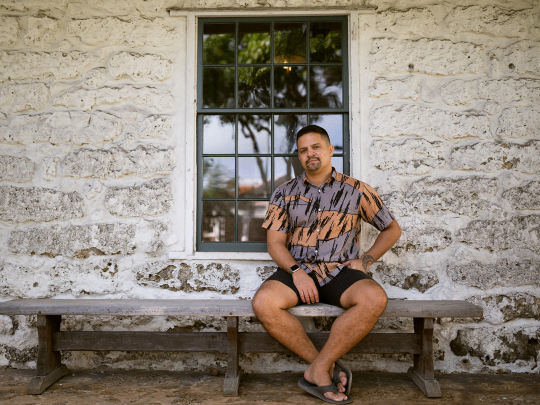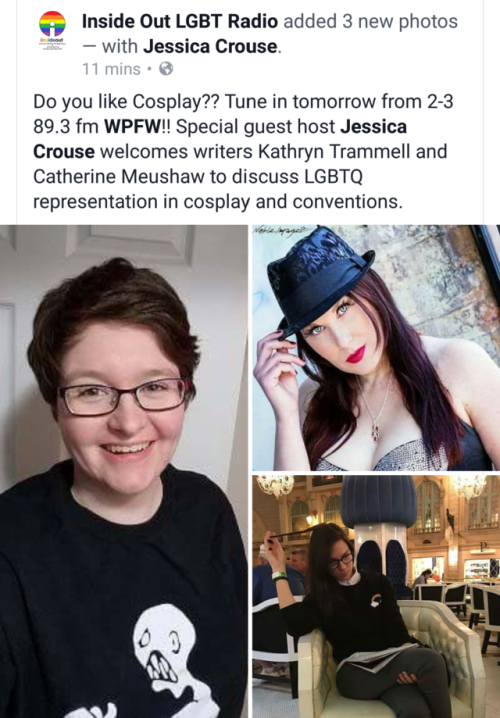#radio host
Join me tomorrow Tuesday March 28th as we discuss LGBTQ representation in cosplay and conventions. http://www.wpfwfm.org/radio/
Facebook:Www.facebook.com/JessicaLCrouse85
Instagram: JessicaCrouse
Twitter: dramaaddict
YouTube: Modern Xena Warrior Princess
Post link
This month’s interview is with N. Haʻalilio Solomon, who wears many diverse and interesting hats in his roles as Hawaiian and Tahitian language Instructor, Hawaiian Translator & Radio Host. He is also the president of the Kealakai Center for Pacific Strings. If you would like to hear more about Haʻa’s work, check out his episodeonField Notes, a podcast about linguistics fieldwork.

Photo courtesy of Mahina Choy-Ellis and NMG Network
What did you study at university?
BA: ʻōlelo Hawaiʻi (Hawaiian language)
MA: LinguisticsPhD: Linguistics
What is your job?
I am an educator, translator, writer and editor for Hawaiian language media content, radio host, and a researcher.
As a radio host, I get to play old Hawaiian music on a weekly university-radio program which I host entirely in ʻōlelo Hawaiʻi, the Hawaiian language. Every Sunday afternoon, I pull vinyl records, CDs, and digital files of older mele Hawaiʻi (Hawaiian music) based on a theme I have chosen beforehand. It’s so much fun because I get to choose different themes each week! One week, the theme might be “songs about steamships”, and another week, it might be “songs composed in the 19th century”. After I select a theme, I play songs related to that theme, presenting and talking about them in Hawaiian the entire time, and I also get phone calls that request songs related to the theme as well! My radio program is a great way to celebrate and normalize Hawaiian language in its ancestral homeland in a very accessible venue.
Another job I have held is a translator and interpreter for Hawaiian and English language. This has been an eye-opening position for me to realize certain attitudes people have toward (or against) Hawaiian language. For example, even though Hawaiian is a co-official language of Hawaiʻi, some people think it does not belong in certain domains. I have been the interpreter in court several times for people who have chosen to represent themselves while Hawaiian, and most times, the general vibe in the courtroom is awkward at best and condescending at worst. Legal officers and judges, who are actors on the behalf of the government, have typically negative reactions towards requests for Hawaiian language representation. This is a problem, especially given Hawaiian’s co-official recognition status, but also because these reactions do not apply to requests for interpretation for other languages (which are not official). These experiences motivate me to raise awareness and bring justice to Hawaiian speakers by ensuring their right to interpretation is protected.
Helping people have more positive ideas about Hawaiian language involves normalizing it in the linguistic landscape of Hawaiʻi. FLUX is a local lifestyle magazine that has recently hired me as the Hawaiian language editor for their publication. This is helping to reshape the linguistic landscape by adding Hawaiian language pieces to the discourse here in Hawaiʻi, but is especially relevant and effective because of the content we choose to feature. FLUX has always paid important attention on arts & culture, local politics, and other topics that are current and high-profile. To feature these topics in Hawaiian starts to shift the paradigm by de-centering English, even just a bit, and move Hawaiian language media back into a more prominent role. This also demonstrates the role that media has in language revitalization!
How does your linguistics training help you in your job?
Linguistics grounds all of my multilingual work, and when I have to think about certain translation decisions, the theories that have been robustly developed in the field of linguistics inform my decisions and make that process easier. As a polyglot, linguistics is my favorite subject, and it has given me a foundation and training that informs all of my work.
What was the transition from university to work like for you?
I was fortunate to start teaching Hawaiian as a lecturer, and then I started pursuing an MA in Linguistics to justify my promotion to an instructor, so the transition felt serendipitous and mutually beneficial for my graduate studies and my career. And in the context of language revitalization, as in Hawaiʻi, a career is synonymous with a way of life, philosophy, and a calling to which I am committed both professionally and personally.
Do you have any advice you wish someone had given to you about linguistics/careers/university?
Start making flashcards to memorize the IPA. HAHA! But seriously, linguistics as a formal training certainly has an application in certain careers, like research, preservation, education, etc. But I have been blessed to have so many professors, mentors, and cheerleaders who have always helped me realize how my training as a linguist can be applied all sorts of interdisciplinary projects. This is always so much fun for me!
Any other thoughts or comments?
I feel giddy when I tell others “I am a linguist”. The doors that this field has opened for me have come back to bless me tenfold.
Related interviews:
- Interview with an academic linguist
- Interview with an Interpreter
- Interview with an ESL teacher, coach and podcaster
- Interview with a Freelance Translator and Editor
- Interview with a Language Revitalisation Program Director
Recent interviews:
- Interview with a Customer Success Manager
- Interview with an Impact Lead
- Interview with an Online Linguistics Teacher
- Interview with an Academic Linguist
- Interview with a TV Writer
- Interview with a Senior Analyst, Strategic Insights & Analytics
Resources:
- The full Linguist Jobs Interview List
- TheLinguist Jobs tag for the most recent interviews
- The Linguistics Jobs slide deck (overview, resources and activities)
The Linguistics Jobs Interview series is edited by Martha Tsutsui Billins. Martha is a linguist whose research focuses on the Ryukyuan language Amami Oshima, specifically honourifics and politeness strategies in the context of language endangerment. Martha runs Field Notes, a podcast about linguistic fieldwork.

